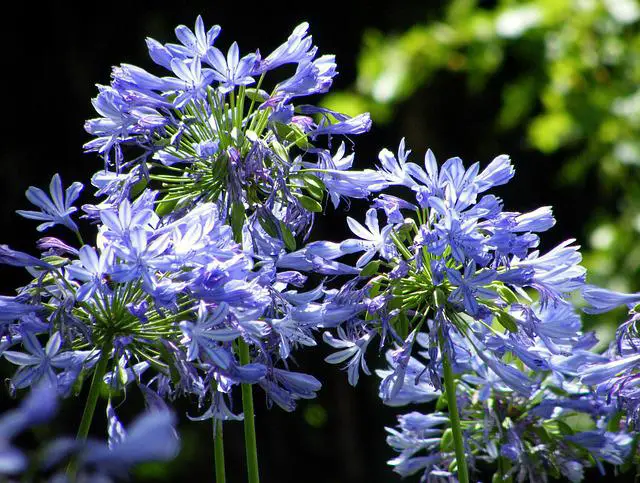Agapanthus are pretty plants to have in your garden, and many people no doubt have had these flowers in their garden for a long time. However, not many people might be aware of the fact that these plants are in fact poisonous!
Agapanthus plants are indeed poisonous. All its parts contain sap that contains the toxin- Saponin. However, Saponin rarely causes severe toxicity or death in humans.
You might also be wondering if agapanthus poison is fatal to your pets, read on to get this query answered.
What Makes Agapanthus a Poisonous Flower?
All parts of the Agapanthus are toxic, that is, the leaves, rhizomes, and bulbs. Even the transparent sticky sap is laced with the saponins, making it capable of poisoning anyone who consumes it.
The Agapanthus sap contains a toxic compound called Saponin, which is toxic to humans and animals.
In some parts of Africa, this plant has also been used as a means of abortion. That said, this plant can affect pregnant women due to the production of prostaglandins which can induce contractions of the uterus.
Women who are expecting should steer clear of agapanthus plants and by-products.
Find out how to fix yellow agapanthus leaves.
Agapanthus Poisoning Symptoms
If you are growing plants in your garden, it is very important to know about agapanthus poisoning. In particular, you need to know how to suspect agapanthus poisoning which means knowing all the symptoms.
Saponins are inactivated by the chemical Cholesterin. Hence, the toxicity is limited to the mucous membranes. A part of the body that mostly contains mucous membranes is the stomach, mouth, nose, and lungs.
Hence, ingesting any part of the agapanthus plant can cause gastrointestinal upset. This is because mucous membranes line the stomach. A range of symptoms will present themselves post-ingestion of agapanthus plant parts:
- Vomiting
- Abdominal pain
- Diarrhea
- Nausea
Eating any part of this plant can also cause mouth ulcers, and if critical, medical assistance may be needed.
But, you don’t have to ingest the agapanthus plant to experience the poison! Contact of the sap with the skin or eyes will result in the following symptoms:
- Rashes
- Blisters
- Swelling
- Burning sensation
- Reddening
- Possible watering of eyes
This is why gardeners always advise protective gardening gloves when handling agapanthus plants. Depending on the sensitivity of your skin to agapanthus, sap you may need to contact a doctor.
Don’t know where to plant your agapanthus plants?
Are Agapanthus Poisonous to Humans?
Yes, all the parts of the Agapanthus plant are poisonous to humans! This means you will have to keep an eye on toddlers and children in the garden if you have a hoard of agapanthus planted.
Even touching the sap, is not recommended and precautions should be taken if you intend on touching it. Sap can cause skin irritation and inflammation.
Also, ingesting any part of agapanthus plants will create ill effects centered around the stomach.
In both cases, if symptoms don’t resolve a doctor will have to be consulted for treatment.
Common symptoms are gastrointestinal (GI) conditions such as diarrhea, vomiting, and pain.
Are Agapanthus Poisonous to Dogs?
Yes, Agapanthus is poisonous to dogs. Try to keep your dog away from this plant, or you could find yourself facing a visit to the vet.
There is a silver lining though! Dogs are not as likely to start eating agapanthus plants.
A sniff lets them know that this plant won’t be very appetizing, they quickly move on. But, they may still be some chances of puppies having a taste.
Are Agapanthus Poisonous to Cats?
Again yes this plant is toxic to cats and even more so because they have a lower weight than dogs. A smaller dose of the sap could cause evident effects.
If eaten by your cat, similar symptoms to humans (nausea, vomiting, and diarrhea) will be visible. But an even more terrifying scenario is if enough of it is consumed, it may prove to be fatal for your cat!
Even if it comes in contact with your cat’s skin, you could be looking at rashes, skin swellings, and even blisters on their fur coat.
Treatment for Agapanthus Poisoning in Pets
If your cat or dog has ingested some of the poisonous sap, rinse out your pet’s mouth with clean water. Also, call your vet, he will advise you on what to do next.
Keep your eye on your pet for the next 24 hours. If his condition gets worse you will have to take him to an animal clinic.
Skin contact with the agapanthus too should be washed away as quickly as possible. Watch how your pet behaves, if the symptoms are bad, again we need to consult a vet.
Make sure in treating and touching your pet, that you are wearing surgical gloves, so the poison does not affect yourself!
Is it Possible to Have an Allergy to Agapanthus?
Yes, some folks have an allergy to saponin and agapanthus plants are high in saponins. This makes it possible to have an allergy not just to agapanthus but to other plants as well that have saponins.
For example, the outer coating of quinoa grains has saponins which causes allergies in some people with heightened immune responses.
Allergies are widely prevalent in people around the world. It is very important to take care in the garden when you are sensitive to saponins as agapanthus contains high amounts of it.
Conclusion
Yes, agapanthus plants are poisonous. The aboveground parts are poisonous but not as poisonous as the bulbs themselves! The poison present in the agapanthus plant is Saponin, it can affect humans and animals alike.
Symptoms of agapanthus poisoning include:
- Vomiting
- Abdominal pain
- Diarrhea
- Nausea
- Rashes
- Blisters
- Swelling
- Burning sensation
Use gloves when handling agapanthus, keep your pets and kids away from the plants to avoid accidental consumption. If eaten, a doctor may be necessary to help the symptoms subside.
Be careful when growing this plant, Agapanthus can become a weed!
FAQs
No agapanthus flowers are not edible despite their innocent and attractive appearance! The whole plant is ‘out of bounds’ when it comes to safety and palatability. Eating their blue, purple, or white delicate flowers is not an option for kids or pets.
Yes, agapanthus is poisonous to sheep. Seeing as agapanthus is dangerous for humans, dogs, and cats, livestock animals are at risk also. Eating the bulbs is especially dangerous for livestock animals because it is palatable and this makes it possible for them to consume large amounts.


